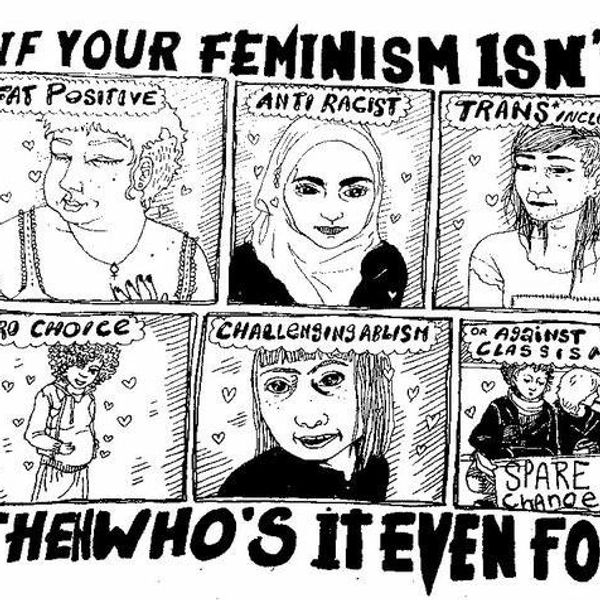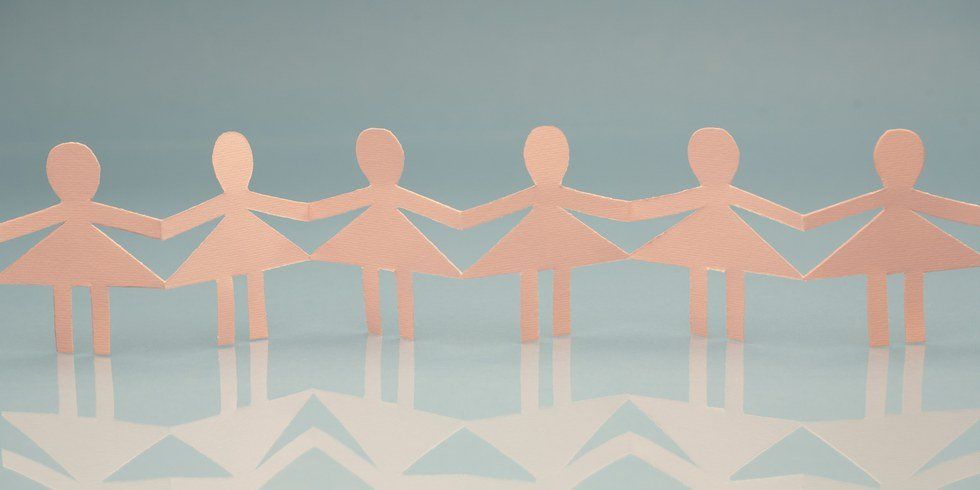The feminist movement has come a long way. Such a long way, in fact, that counterarguments to the call for a further expansion of feminism are becoming prevalent and prominent viewpoints. How many times have you heard a well-intentioned (or maybe a not so well intentioned) person declare that feminism needs to die out because "Women already have equal rights"? There are even women who believe that feminism, as a movement, has achieved its goals because they personally do not feel oppressed. Some people believe that feminism has made such significant headway that there is no longer a need for feminists to rally. “What more can society do to better the condition of women and feminism in America?” some might ask, implying that, as a culture, we have come as far as we ever will in the demand for equal rights.
However, as an American female, I recognize the strides we have made, such as equal voting rights and Title IX, but also dare to challenge the progress that has yet to come. As a country, we have yet to have a female President, yet to completely equalize pay in jobs where women are equally as qualified as men, yet to raise a generation on the idea of “Don’t rape” instead of “Don’t get raped.” So, in many ways, I am here to ask the same question: “What more can society do to better the condition of women and feminism in America?” If society could work together as a whole to continue to make strides for feminism, we would eventually truly recognize an equal world.
As Bell Hooks explained in her book Feminism is for Everbody: Passionate Politics, “Simply put, feminism is a movement to end sexism, sexist exploitation, and oppression… As a definition it is open-ended. To understand feminism it implies one has to necessarily understand sexism.” Feminism (arguably) began in 1848 at the Seneca Falls Convention. The first women’s rights convention gathered to contemplate a woman’s true role and purpose as well as address the right for women to vote. The leaders of that convention, including Elizabeth Cady Stanton, Cary Chapman Catt, and Lucreita Mott, were pioneers of movement they could only ever imagine.
Much has changed since the first rally for feminism in 1848. The 19th amendment granted women the right to vote in 1920, an act that wasn’t fully enforced in every state until the 1960’s, but is successfully implemented today. Title IX was passed in 1972, an amendment that prohibited gender discrimination in educational institutions and eventually led to 56% of college educated students being female in 2012. In 1973, women were granted the right to a legal abortion, a powerful accomplishment for feminism because it gave and continues to given women the right to their own bodies. Additionally, as of today, three out of nine judges on The Supreme Court are female. These are some of the many progressions the feminist movement has inspired. These advances indicate that our lives, society, and culture would be vastly different if women didn’t launch a feminist movement over a century ago. However, I argue that much more could be done to advance gender equality.
A huge problem expressed in our society is that being female in itself is perceived as a crime. I can’t explain it any better than Jessica Valenti did in her book "Full Frontal Feminism": “What’s the worst possible thing you can call a woman? Don’t hold back, now. You’re probably thinking of words like slut, whore, bitch, cunt (I told you not to hold back!), skank. Okay, now, what are the worst things you can call a guy? ‘Fag,’ ‘girl,’ ‘bitch’, ‘pussy’. I’ve even heard the term ‘mangina.’ Notice anything? The worst thing you can call a girl is a girl. The worst thing you can call a guy is a girl. Being a woman is the ultimate insult.”
There is still an inherent need for feminism, even though the need isn’t as strong as it is in countries such as India, Nigeria, and the Dominican Republic where females are forced to be child brides and are often sodomized so they don’t enjoy intercourse. American females enjoy many more rights, including being able to marry at will and have a personal right to their bodies, that females in other countries aren’t given. However, even though American females have a right to basic rights doesn’t mean that they are perceived or treated as equal to men. Simply because they have less issues than women globally does not mean that they should not push further for the equality they are entitled to as a human being.
American females continue to face various challenges to achieve gender equality. Women are still vastly outnumbered in Congress. In the House of Representatives, there are currently 362 men to 16 women; In the Senate, there are 83 men to 17 women. The biggest insult one can hurl at another remains a reference to female genitalia, implying that women are weak, and even worse, that the worse thing you can be is a woman. Rape culture is so rampant that jokes on raping women are common and constantly promoted by the media. The megahit movie “This Is The End” dedicated an entire scene to the protagonists arguing over who would rape Emma Watson. Critics deemed the movie Grade A and it grossed over $126,000,000.
Strides have of course been made to empower feminism, for example, in 2014, Duke University students launched a popular social media movement. A photo series titled “Who Needs Feminism?” took on a larger platform as it gained media attention around the world. A variety of people, mostly female, stand facing the camera with a sign in their hands, typically a whiteboard. Written on the whiteboard, or occasionally a piece of paper, is a sentence or two that begins with “I need feminism because…” The answers range from “I don’t want my gender to make choices for me,” to “people still ask what the victim was wearing (in cases of rape) to “gender roles should not limit my decisions.” With hundreds of people continuously adding to the movement every day, the project has been going strong for over a year.While movements such as "Who Needs Feminism?" are powerful, there is still plenty of work to do in trying to achieve equality. Debunking gender stereotypes will be a long and strenuous process, but it is something we absolutely need to do to achieve fairness.
Society can choose to elect officials based on who they are, looking past gender elements. More females would be in office, which would be a good start. We can, as a culture, stop promoting weak female roles in the media and stop treating the female body as an object whose pure goal is to be desirable. Education on feminism would bring a lot more people around to aid the movement. Further education on sexual consent would also help, teaching people that No means No and that how a girl dresses has nothing to do with if she is “asking for it” or not.
Associating a woman’s menstruation with her being inadequate to make responsible decisions is also a horrible myth society needs to push past. We need to work on putting an end to the intense sexualization of the female body, as viewing girls as nothing more than sex objects to be played with is one of the things hindering us from achieving equality. If we started respecting the female body as we respect a male’s body, society, as a whole, would improve.
Generalizations are also harmful. “Girls are so clingy.” “All girls are crazy.” “You run like a girl.” These stereotypes put all girls in a category that they all do not fall into. Bell Hooks said it best when she stated, “Feminist thinking teaches us all, especially, how to love justice and freedom in ways that foster and affirm life.” Working to better society as a whole, we should stop generalizing genders.
As Americans, we have made notable and extensive progression in supporting women and feminism. Despite how far we have come, we still have miles to go.





















